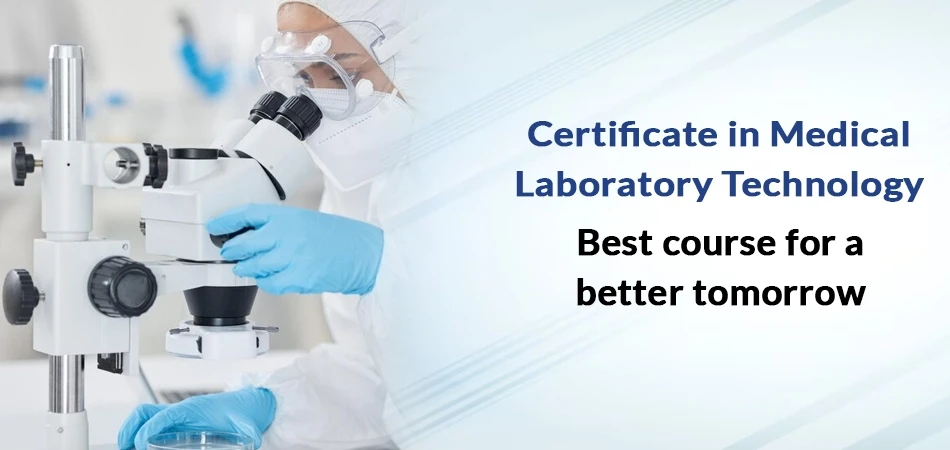Certificate in Medical Laboratory Technology: Best Course for a Better Tomorrow

The healthcare sector has a significant need for Medical Lab Technology (MLT). These specialists address a patient's needs in a laboratory environment instead of a conventional medical facility like a hospital.
Short-term specialized courses focus on teaching students clinical laboratory skills and equipping them to support healthcare professionals in identifying, understanding, and managing illnesses. They help analyze samples and showcase the results for assessment.
Who is Eligible for this course?
The candidate must have at least accredited with a 50% score in grade 12 with physics, chemistry and biology from a recognized board.
What are the Different Medical Lab technology programs available at Ganesh Paramedical College?
The different types of Medical lab Technology courses available are:
CMLT (Certificate in Medical Lab Technology)
DMLT(Diploma in Medical Lab Technology )
BMLT (Bachelor’s in Medical Lab Technology)
MMLT (Master’s in Medical Lab Technology)
What is the complete duration of all MLT courses?
The duration of the courses may vary as per the program
CMLT - 1 Year
DMLT- 2 years
BMLT- 3 years
MMLT- 2 Years
What is the need for a Certificate in Medical Lab technology?
The demand for certified MLTs is increasing due to the expansion of hospitals, clinics, and laboratories, a trend that has become more apparent after the COVID-19 crisis.
- Several online platforms have recently launched a handful of courses to meet the increasing need for trained phlebotomists.
- By enrolling in this course, professionals can enhance their skills and protect their current positions and homes while also boosting their career success.
- Working professionals strive to assist students in developing communication skills to effectively interact with patients.
What are the Career options after completing the Course?
There are multiple job opportunities these are
- Laboratory Technician,
- Medical Officer,
- Research Associate,
- Medical Record Technician,
- Resident Medical Officer,
- Laboratory Testing Manager,
- Associate Manager,
- Technology Manager,
- Laboratory Manager,
Complete Overview of the CMLT course
| Particulars | Details |
| Course Level | Certificate, Diploma, Bachelor’s, Master’s |
| Duration | 1 Year, 2 years 3years |
| Eligibility | 12th passed(From any recognised board) Bachelor’s in science for Master’s |
| Average course fees | 50,000 to 1 Lakh Rupees Annually |
| Average Annual Salary | 2-6 Lakh(Vary on Experience) |
| Job Opportunities | Laboratory Technician, Medical Officer, Research Associate, Medical Record Technician, Resident Medical Officer, Laboratory Testing Manager, Associate Manager, Technology Manager, Laboratory Manager, |
What are the Key Elements to see Before Choosing the Best Paramedical college?
Accreditation: This needs to be confirmed by ensuring that the college is accredited by appropriate authorities or associations. Accreditation indicates that the institution meets certain standards for quality and education.
Consider the college's curriculum: Consider processes and programs to confirm they are compatible with your chosen paramedical career path and include hands-on training or internship options.
Learning and Capability: Faculty associates should have their capacities and performance reviewed. Skilled and well-informed educators can greatly improve the quality of your academic experience.
Explore the campus: Look for facilities like labs, libraries, and tools by either calling in person or conducting online research. These resources are required for hands-on knowledge and improving technical abilities.
Placement: Review the college placement and the different job support assistance offered. A strong partnership with healthcare organisations and training opportunities are important aspects of a good college.
Location and surroundings: Look into the school's location and nearby environment to determine if it matches your desired level of accessibility, housing options, and overall circumstances.
Examine the program's education costs: Make sure to confirm if the college delivers any financial assistance, scholarships, or grants that could potentially reduce your costs.
Personal Fit: Take into account your choices regarding personal suitability. Select a university that provides a feeling of comfort and assistance, where you can be confident in your ability to develop both academically and personally.
Enrol now
Enrolling in a CMLT course may lead to obtaining a rewarding role in the healthcare sector. This career offers great financial prospects for students who are keen on this area. The growing development of the industry has raised the demand for paramedical professionals. Enrollment is presently open at Ganesh Paramedical College in Delhi, a prestigious institution, to obtain training as a healthcare professional essential for assessing and managing patients in medical environments. In addition, we also offer courses in the BMLT course and MMLT course.
People may ask
Q1. Do paramedical courses require NEET?
Ans. No, NEET is not required for paramedical courses. However, a few colleges might have university entrance exams for students.
Q2. Is there any entrance exam for paramedical courses?
Ans. Admission to some of the paramedical courses is based on entrance exams. This includes JIPMER, NEET-UG, MHT CET, etc.
Q4. How many years is a Paramedical course?
Ans. Certificate courses go on for a duration of 1-2 years while degree courses are for 1-4 years.
Q5. Is paramedical a good career?
Ans. There are ample job opportunities for paramedical graduates and an increasing demand for trained people in these fields.

